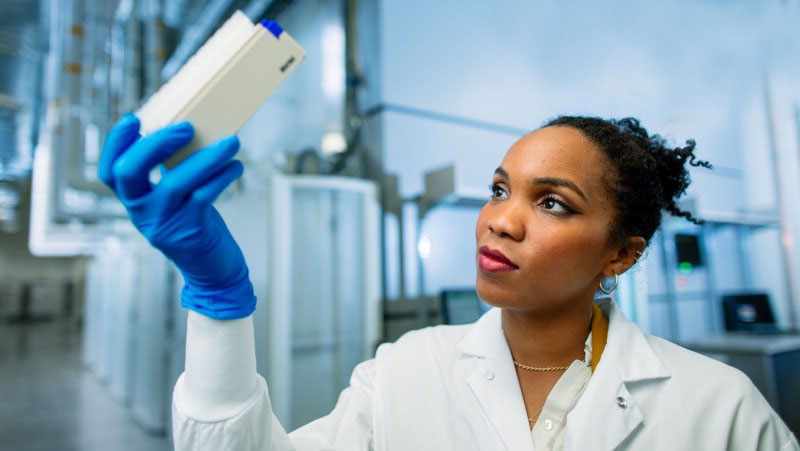-
Featured News
Mayo Clinic to be Home of National Precision Medicine Initiative (PMI) Cohort Program Biobank
 ROCHESTER, Minn. — Mayo Clinic will be awarded $142 million in funding over five years by the National Institutes of Health (NIH) to serve as the national Precision Medicine Initiative (PMI) Cohort Program biobank. The biobank will hold a research repository of biologic samples, known as biospecimens, for this longitudinal program that aims to enroll 1 million or more U.S. participants to better understand individual differences that contribute to health and disease to advance precision medicine.
ROCHESTER, Minn. — Mayo Clinic will be awarded $142 million in funding over five years by the National Institutes of Health (NIH) to serve as the national Precision Medicine Initiative (PMI) Cohort Program biobank. The biobank will hold a research repository of biologic samples, known as biospecimens, for this longitudinal program that aims to enroll 1 million or more U.S. participants to better understand individual differences that contribute to health and disease to advance precision medicine.
Precision medicine is an emerging approach for disease treatment and prevention that takes into account individual variability in genes, environment, and lifestyle for each person.
The Precision Medicine Initiative was launched by President Barack Obama in 2015 “to bring us closer to curing diseases like cancer and diabetes, and to give all of us access to the personalized information we need to keep ourselves and our families healthier.” Data from biological samples combined with information from lifestyle and health questionnaires, medication history, electronic health records, physical exams, and environmental exposures and real time physiology tracked through digital technologies, will help researchers examine individual differences in health and disease.
“This range of information at the scale of 1 million people will be an unprecedented resource for researchers working to understand all the factors that influence health and disease,” says Francis S. Collins, M.D., Ph.D., NIH director. “The more we understand about individual differences, the better able we will be to tailor the prevention and treatment of illness.”
The Precision Medicine Cohort Program biobank will reflect the diversity of the U.S. population by including participants from diverse social, racial/ethnic, and ancestral populations living in a variety of geographies, social environments, and economic circumstances, and from all age groups and health statuses. The PMI Cohort Program biobank then will provide the infrastructure to store and curate more than 35 million biospecimens.
MEDIA CONTACT: Colette Gallagher, Mayo Clinic Public Affairs, 507-284-5005, newsbureau@mayo.edu
“Mayo Clinic has a responsibility to seek new medical knowledge and share that knowledge with others. The Mayo Clinic Center for Individualized Medicine is proud to accelerate research nationally through the PMI Cohort Program biobank,” says John Noseworthy, M.D., Mayo Clinic president and CEO. “This important effort over the coming years complements the Destination Medical Center initiative and Discovery Square at Mayo Clinic designed for global research innovation and collaboration.”
“Mayo Clinic believes that individualized, or precision, medicine will help improve the quality of health care, while lowering cost through more accurate diagnosis, avoidance of unnecessary testing, and delivery of more tailored, effective and safer therapies,” says Keith Stewart, M.B., Ch.B., Carlson and Nelson Endowed Director, Mayo Clinic Center for Individualized Medicine, and Vasek and Anna Maria Polak Professor of Cancer Research.
Having identified individualized medicine as a strategic priority, Mayo Clinic is investing in its Florida and Minnesota campuses in the PMI Cohort Program biobank with a 30,000-square-foot facility expansion, including advanced automation technology, state-of-the-art robotic freezers, and personnel.
“This is an extraordinary opportunity for Mayo to participate in, and share, our expertise with an important national research initiative,” says Stephen Thibodeau, Ph.D., the David F. and Margaret T. Grohne Director, Mayo Clinic Biorepositories Program, Center for Individualized Medicine, and co-principal investigator of the PMI biobank award. According to Mine Cicek, Ph.D., director of the Biospecimen Accessioning and Processing Core laboratory and co-principal investigator, Mayo Clinic Bioservices, the highly automated facility allows for efficient and accurate handling and processing of specimens, which will include robotic systems to separate, label, and store biospecimen components, including automated DNA extraction.
“Our facilities are built to serve as a vital resource for storing and analyzing all biospecimens, under the highest-level quality possible and to minimize loss, damage, or contamination, with the ability to retrieve them efficiently for research use,” says Dr. Thibodeau, the William H. Donner Professor.
In addition to the Mayo Clinic Biobank in Minnesota, Biospecimen Accessioning and Processing Core laboratory site on Mayo Clinic’s Florida campus will provide sample storage for 20-25 percent (8-10 million samples) of the collection, to protect the national resource from a localized natural disaster.
Mayo Clinic also will harness the resources of Mayo Medical Laboratories (MML) to accomplish the goals of the PMI Cohort Program biobank. The MML nationwide network covers all 50 states with more than 300 couriers and longstanding relationships with major logistic providers that ensure the shortest transit time possible for specimens. Today, MML receives 35,000-40,000 specimens per day and performs 23 million tests per year.
Once established, the PMI Biobank will be a major force in advancing precision medicine and contributing to research and improved health care.
About the NIH
NIH, the nation's medical research agency, includes 27 institutes and centers, and is a component of the U.S. Department of Health and Human Services. NIH is the primary federal agency conducting and supporting basic, clinical and translational medical research, and is investigating the causes, treatments and cures for common and rare diseases. For more information about NIH and its programs, visit http://www.nih.gov.
About Mayo Clinic's Center for Individualized Medicine
The Center for Individualized Medicine discovers and integrates the latest in genomic, molecular and clinical sciences into personalized care for each Mayo Clinic patient. For more information, visit http://mayoresearch.mayo.edu/center-for-individualized-medicine/
###
About Mayo Clinic
Mayo Clinic is a nonprofit organization committed to clinical practice, education and research, providing expert, whole-person care to everyone who needs healing. For more information, visit http://www.mayoclinic.org/about-mayo-clinic or https://newsnetwork.mayoclinic.org/.







